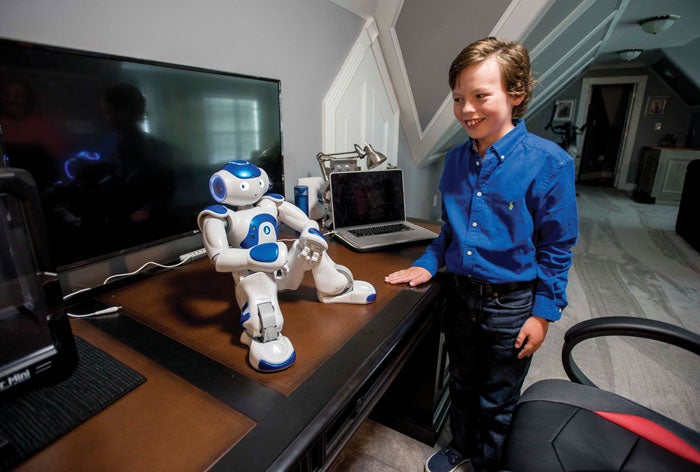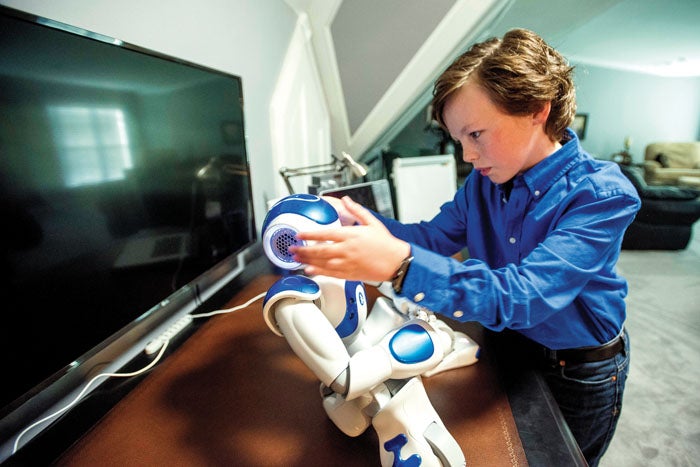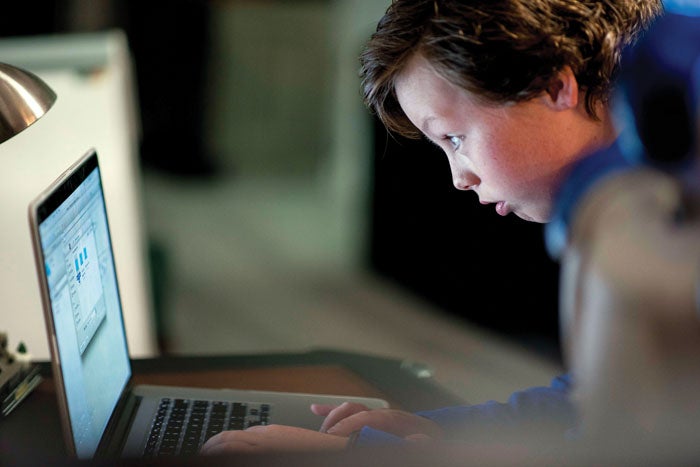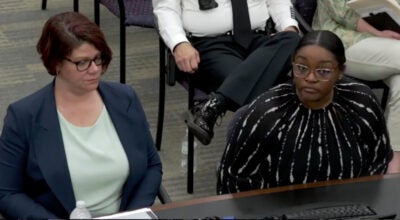‘This is where I shine’: 10-year-old finds a fit with Mensa
Published 12:00 am Thursday, November 1, 2018
By Maggie Blackwell
For the Salisbury Post
SALISBURY — Mike Wimmer is a high school freshman, a programmer, an app developer, and a speaker at Mensa’s annual gathering, both this year in Indianapolis and next year in Phoenix.
Mike is 10 years old.
“Everyone thinks their child is brilliant,” says Melissa Wimmer. “As time went by, I didn’t realize your 2-year-old isn’t typically writing his full name in sidewalk chalk. At age 4, he knew all his states.”
“Our next nephew was 10 years older, so we didn’t have anyone to compare him to,” says Mark Wimmer. “When he was 3, he went to a summer day camp where they had sidewalk chalk. When we picked him up one day, the counselor said, ‘Did you know he could do all this?’ and we said, ‘Well, yes.’ We didn’t put a whole lot of stock in it.”
“He has a September birthday,” Mark continues, “so we tried to put him in pre-K early, but they required an assessment. So we took him for the assessment. After that, the psychologist called us and said, ‘We need to talk.’
“Turns out, he maxed her test out. In her words, ‘He is not gifted; he is profoundly gifted.’”
Still, Mike was not allowed in school early. The Wimmers kept Mike home and worked with him for a year, searching for the best way to feed a child who hungered for learning.
“Finally, we came upon Mensa,” Mark says. “Mensa gave him the credibility he needed.”
According to the Mensa website, it is an international organization of people who attain a score in the upper 2 percent of the general population on an intelligence test. Mensa has no other qualifications.
Mensa has no political, religious or social agendas and exists, among other reasons, to provide social and intellectual opportunities for its members.
“My age,” Mike says, “has been a big problem for me. Just like pre-K, they shut me out because I was too young. One time we tried to contact the community college and were thinking I could take some classes, but that didn’t work out.”
In many cases, however, Mike’s Mensa standing has afforded him opportunities that most his age might not — like summer camp at MIT the past three summers.
“He was 7 the first year,” Melissa says. “The registrar assumed it was a typo and he was 17. We went to Boston and got a hotel room because he was too young to stay the nights. When I took him that first morning, the registrar looked at the sign-in sheet, looked at Mike, and looked at the sheet again.”
“I told him, ‘Just give him a chance; this is his thing.’ When I picked him up at the end of the day, he said, ‘You were right! This is his thing.’”
“(The registrar) called me the second day and advised me Mike was about to finish the entire week’s curriculum and asked if he could give him supplemental material. I said yes, as long as it’s age-appropriate.”
Mike has attended two more summers with no question about his age or capability.
“Mike’s very good at reading others,” Mark says. “He can sit with fifth-graders and participate in a conversation on racing. It’s good to have conversation with others.”
The biggest adjustment to moving to high school this year, Mike says, is being around different kids.
“They’re much taller than me. I had to get used to that, but now I don’t have to ‘bring down’ my conversations, as I used to.”
Mike attends Concord First Assembly Academy in Concord, which boasts about 1,000 students.
The move from fifth to ninth grade was a big one, but he is handling it well. With a schedule that includes honors English, honors government and economics, honors biology, honors geography, Spanish I, honors engineering and Bible class, one might think he would falter a bit. Report cards just came out, and he scored all A’s — “high A’s,” his mom says with a smile.
First Assembly offers before-school clubs for students to share common interests. Mike participates in Coffee and Cars and enjoys talking with the other guys. His favorite is the Corvette ZR1 — “It’s the fastest one you can buy.” It has a 755-horsepower engine and eight-speed transmission and goes from 0 to 60 in 2.67 seconds.
Models of the car have a place of prominence in Mike’s playroom. But the real spotlight in the playroom is Mike’s work desk. On a nearby wall is a framed check — his first payment for apps he wrote.
Mike’s beloved robot, Infinite, sits atop the desk.
“I named him Infinite because his possibilities are infinite,” he says.
As he begins to demonstrate what he’s programmed Infinite to do, he can’t help smiling.
“This is where I shine.”
Infinite is a Nao robot by the company Softbanks. Mike received him for Christmas two years ago. Infinite greets avisitor, blinking and making hand gestures, then dances to Michael Jackson’s “Thriller” — all choreographed and programmed by Mike.
Mike has created his own company, Next Era Innovations.
“In the future, they’ll be looking back on the 2000s as the robotic age,” he says. “When I speak to big groups, like in a conference hall, he’s not loud enough for them to hear. So I 3D-printed a microphone. It transmits to the speakers. I can hook it up to a school PA system.”
Mike ordered micro-boards and soldered them to create a Bluetooth-transmitted microphone. Then, using his 3D printer, he created a housing for it. The entire works is about the size of a good grasshopper.
Mike used a microphone when he spoke at the Mensa Indianapolis gathering in July. Now, developers and robot sellers are interested.
“Nao developed one for him, but it was wired, so it limited his movement. And it was huge, so it threw him off balance,” Mike says.
He’s speaking next July at the Mensa Phoenix gathering.
“This year, I’ll be walking step by step through some Python code. He’ll be my professor’s assistant. Hopefully he won’t tell too many jokes.”
A private company has approached Mike to develop apps for the robot to assist autistic students. Mike has obliged with an app that questions students on six emotions and different weather. Students respond with flash cards, and a QR code on the cards tells the robot if they’re correct or not.
Mike was careful that his robot is diplomatic with incorrect answers.
“If it asks, ‘Fluffy white stuff is coming from the sky and it’s cold; what would you wear?’ and they show a swimsuit, he says, ‘Nice try; please try again.’”
Like many kids, Mike has a Lego robot. He has programmed it to solve Rubik’s cube.
Taking an interest in students at an alternative school in South Carolina, Mike communicated with the teacher and offered an incentive. He sent a Rubik’s cube and, if the students made goals on behavior, they got time to try to learn to solve it.
Back at home, Mike figured it out and then programmed his Lego robot to solve it as well. The students at the alternative school were so captivated by the opportunity to work on the Rubik’s cube, Mike used his own money and sent a cube for each student to have his own.
The company that produces Infinite, Softbank, holds a Nao conference each year. Last year, Mike asked to attend and the company asked what his interest was. He sent a list of his robot’s accomplishments, and they requested his code. He sent it, and they invited him to be a presenter at the conference.
“He marched right up there and spoke to a room packed with adults,” his mom says, “IBM people, programmers from India, you name it. He just goes up there and explains.”
“He doesn’t get nervous,” his dad adds. “But we do.”
Mike doesn’t know exactly what field he wants to pursue as an adult yet, but he’s clear on one thing: he wants to be an entrepreneur. His mentors in Mensa include a retired business owner in Boston who advises startups. Another is a managing emergency physician who teaches robotic students as an adjunct professor.
“I recommend Mensa to anyone who considers it. It’s a great place to find mentors or even a friend your age who is like you.”
“The adults at the gathering know what it was like to be in my shoes. They get it. They try to support kids who are having the same issues.”
“It’s a great organization I’m a part of; it has provided me with many mentors all over the country. Those mentors have helped me make some smart business decisions. Mensa has been a great, credible resource to show educators I do have the potential to do more than they think.”
Just like his robot Infinite, the possibilities for this 10-year-old are endless.
More News






